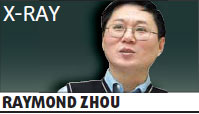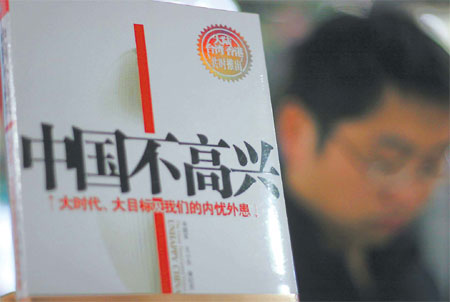 China is not happy. In fact China is "mad as hell and is not going to take this any more", to paraphrase a line from Network, the 1976 movie.
China is not happy. In fact China is "mad as hell and is not going to take this any more", to paraphrase a line from Network, the 1976 movie.
On closer inspection, it's not China in general but five middle-aged men in China. Their book China Is Not Happy has sold half a million copies in a few months, not counting bootleg copies and online piracy. Assuming buyers buy into their reasoning, a not-insignificant chunk of China is not happy.
The book claims China should assert itself - militarily, diplomatically and every other way imaginable. In this regard China Is Not Happy is a much catchier title than its predecessor, China Can Say No, which shares one of the same authors and was a bestseller in 1996.
Both are milestones in the country's nationalist movement. The difference is that the first one shook the nation while the follow-up has been met with a mixture of admiration, nonchalance and cynicism. The book stems from a few days' conversations with a group of die-hard "neo-leftists" and the authors stand accused of whipping up another jingoistic frenzy for the purpose of selling books.

Speaking of left and right, I should first clarify the definitions because they run counter to their Western parallels - in China, the left wing is considered "conservative" while the right wing equals "liberal". A person who espouses "patriotism" is regarded as "on the right" in the US but over here he is "on the left", even though he would be "conservative" in both countries. It makes sense when you think that China and the US are ideologically antipodean. It's like looking at each other face to face: What's left on my side is the right side on yours.
The five authors of this book, mostly academics in their 40s and 50s, expressed dismay at the rampant "liberalism" among their peers. They view those "liberal elites" as importers of Western ideas and practices, which they say have caused the wealth gap that exists in China, among other sins. On the other hand, they have found a new hope in the young, especially those born after 1980, who have been at the forefront of a reawakening of China's nationalist sentiments.
Contrary to what you may think, the authors are not sloganeering charlatans. They are extremely erudite and lucid. They predicted in the 1996 book that "in less than 10 years, or 15 years at most, the US economy will run into a huge problem" because, as the shared author Song Qiang contends, production and consumption in the US have been knocked askew by massive off-shoring of the manufacturing sector.
The authors are calling for a "conditional split with the West". They see the West as harboring a plan to "drag down" China, ample reason for this country to be shaken out of its post-Olympic contentment and stupor. China should aspire to be "an ambitious and heroic country" ... "conduct business with a sword in hand" ... "the path to victory for a rising power". They plead that the military should "go with the core interests of the country", that diplomats should wind down Sino-French relations and guard against the "roulette" diplomacy of the West. Most of all, China should "dare to wipe out evil and appease the good in the international community" and "clear the way of our growth of decadent winds".
Furthermore, anyone in China who does not share their radical beliefs is labeled a traitor and people like Wang Xiaobo, who advocated a more open and democratic society, are called "defeatists" and "demagogues of today's ugliest culture". They did not use the term "petty bourgeoisie" but came up with a similar moniker - "stripping away the artistic tone" - for those they deem apologists to the West.
OK, if this is too much jargon, let me put their point more bluntly: We are people with grand ambitions, and only grand ambitions suit this grand time and this grand country. As for the rest, you are a bunch of wimps and phonies, if not outright collaborators out to sell out China's interests.
In this Internet age full of soapbox opportunities, this is just what many want to hear. In a newly vociferous environment, the voice of reason is the first one to be drowned out. The more extreme you are, the more attention you'll get. I was pleasantly surprised that many people online questioned the real motive of the writers - to make a fast buck or to promote China's interests. A few reporters have noticed after interviewing the authors that they were not half as "adamant" as they sound in the book. They even mentioned "things in the West that we can learn from".
